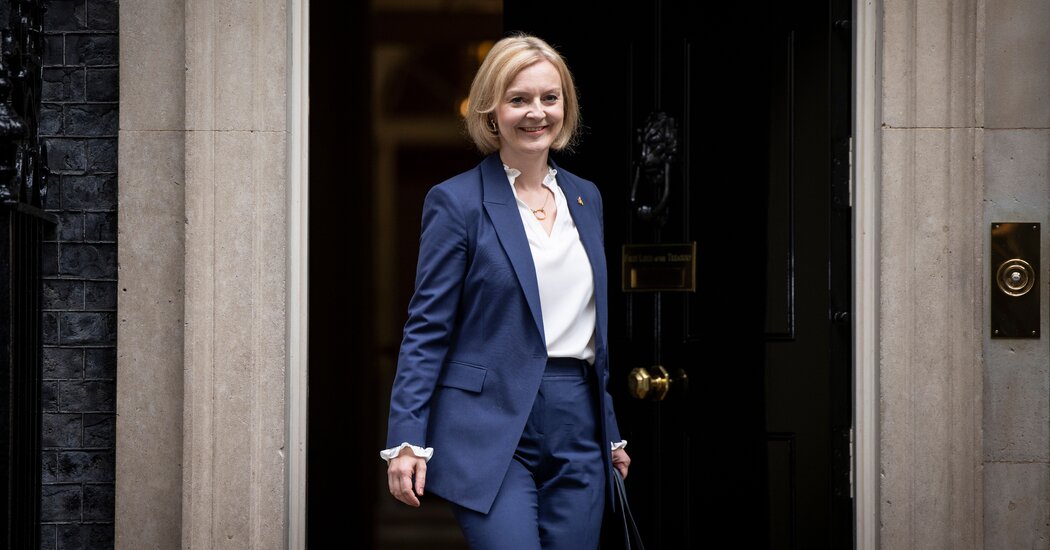LONDON — Prime Minister Liz Truss of Britain campaigned as a tax cutter and champion of supply-side economics, and he or she gained the race to exchange her scandal-scarred predecessor, Boris Johnson. Now she has delivered that free-market agenda, and it might sink her authorities.
4 days after Ms. Truss’s tax cuts and deregulatory plans surprised monetary markets and threw the British pound right into a tailspin, the prime minister’s political future seems to be more and more precarious as nicely.
Her Conservative Celebration is gripped by nervousness, with a brand new ballot displaying that the opposition Labour Celebration has taken a 17 share level lead over the Tories. It’s a treacherous place for a first-rate minister in solely her third week on the job.
Labour is seizing the second to current itself because the get together of fiscal duty. With some specialists predicting the pound may tumble to parity with the greenback, economists and political analysts mentioned the uncertainty over Britain’s financial path would proceed to hold over the markets and Ms. Truss’s authorities.
“It’s completely potential she might be changed earlier than the following election,” mentioned Tim Bale, a professor of politics at Queen Mary College of London, who’s an professional on the Conservative Celebration. “It will be very, very troublesome to conduct a full-blown management contest once more, however I wouldn’t rule something out.”
That Ms. Truss ought to discover herself on this predicament so quickly after taking workplace attests to each the unconventional nature and awkward timing of her proposals. Chopping taxes at a time of near-double-digit inflation, when central banks in London and elsewhere are elevating rates of interest, was at all times going to mark Britain as an financial outlier.
However the authorities compounded the shock final Friday when the chancellor of the Exchequer, Kwasi Kwarteng, unexpectedly introduced that the federal government would additionally abolish the highest earnings tax charge of 45 p.c utilized to these incomes greater than 150,000 kilos, or about $164,000, a 12 months.
And Mr. Kwarteng didn’t submit the package deal to the scrutiny a authorities funds usually receives, deepening fears that the tax cuts, with out corresponding spending cuts, will blow a gap in Britain’s public funds.
On Tuesday, the pound stabilized briefly in opposition to the greenback, as did 10-year charges on British authorities bonds, although each started to gyrate later within the day after a senior official on the Financial institution of England signaled an aggressive rise in rates of interest.
The Worldwide Financial Fund, which bailed out Britain in 1976, added to the deepening sense of tension when it urged the British authorities to rethink the tax cuts. In an announcement, it mentioned the cuts would exacerbate inequality and result in fiscal coverage and financial coverage working at “cross functions.”
Rising Inflation in Britain
Already, the specter of upper rates of interest was inflicting the housing market to grab up. Two main British mortgage lenders introduced that they might cease providing new loans due to the market volatility. Greater charges will harm tons of of hundreds of householders who must refinance fixed-term mortgages — property house owners, analysts famous, who’re the bedrock of the Conservative Celebration.
“It’s not just like the U.S., the place individuals are on 30-year mortgages,” mentioned Jonathan Portes, a professor of economics and public coverage at King’s School London.
An estimated 63 p.c of mortgage holders have both floating charge mortgages or loans that may expire within the subsequent two years. And the steep decline of the pound implies that rates of interest must rise even additional than they might have merely to curb inflation.
Ms. Truss, he mentioned, may have taken a extra cautious method: rolling out the supply-side measures first, like plans to untangle Britain’s cumbersome residential planning guidelines and construct extra housing, that are hurdles to financial progress. Then, when inflationary pressures had eased, the federal government may have minimize taxes.
However that was by no means within the playing cards, Professor Portes mentioned, as a result of Ms. Truss and Mr. Kwarteng are free-market evangelists who ardently imagine that reducing taxes will reignite progress, and since they’ve little greater than two years to show across the economic system earlier than they face voters in a common election.
“That is ‘shock and awe,’” he mentioned. “Truss, Kwarteng, and the folks round them suppose they needed to act shortly. The longer they wait, the extra the resistance will construct up.”
Through the marketing campaign, Ms. Truss modeled herself on Margaret Thatcher, who additionally introduced a sequence of free-market measures after taking workplace as prime minister and endured a turbulent couple of years. In contrast to Ms. Truss, although, Thatcher frightened about curbing inflation and shoring up public funds; she even raised some taxes throughout a recession in 1981 earlier than lowering them in later years.
However Thatcher got here in after an election victory over an exhausted Labour authorities, which gave her extra time to climate the downturn and for her deregulatory measures to take impact. She additionally received a carry after Britain vanquished Argentina within the Falklands Struggle in 1982, which uncorked a surge of patriotism.
“Thatcher was pondering in 1979 that I solely want to offer voters one thing they like by 1982,” mentioned Charles Moore, a former editor of The Day by day Telegraph who wrote a three-volume biography of the previous prime minister. “Liz Truss hasn’t received this period of time.”
The higher analogy to Ms. Truss, he mentioned, is Ronald Reagan, along with his emphasis on tax cuts and different supply-side insurance policies, in addition to his relative lack of concern for his or her impact on public deficits. Like Thatcher, Reagan weathered a recession earlier than america started rising once more in 1983. And like her, he had a cushion earlier than he needed to face voters.
Ms. Truss, against this, has taken workplace after 12 years of Conservative-led governments, and three years into Mr. Johnson’s tenure. She must name an election by the start of 2025, on the newest. The Labour Celebration, which had been divided by Brexit and inside disputes, has been galvanized by the brand new authorities’s chaotic begin, particularly Mr. Kwarteng’s plan to chop the highest tax charge, which has allowed Labour to stake out a transparent distinction on problems with financial fairness.
Talking on the get together’s annual convention in Liverpool on Tuesday, the Labour chief, Keir Starmer, declared that the Conservatives “say they don’t imagine in redistribution. However they do — from the poor to the wealthy.”
Labour’s lead of 17 share factors in a brand new ballot by the market analysis agency, YouGov, is the biggest benefit it has had over the Conservatives in twenty years. The Tories gained the help of simply 28 p.c of these surveyed, elevating questions on its capacity to carry on to its present seats, in line with Professor Bale.
That forbidding political panorama solely provides to the problem dealing with Ms. Truss. For the tax cuts to have considered one of their desired results — which is to encourage companies to speculate extra — economists mentioned firms would wish some reassurance that the coverage will not be going to be reversed by a brand new authorities in two years.
“It is a very inexperienced authorities swinging for the fences in a scenario the place Labour is the sturdy favourite within the subsequent election, in the event that they don’t swing too far left,” mentioned Kenneth S. Rogoff, a professor of economics at Harvard. “If one believes that the tax cuts are going to be reversed underneath Labour, and that there’s a excessive probability of a Labour authorities, why would they affect long-term funding?”
Britain, Professor Rogoff mentioned, was additionally rowing in opposition to a lot larger forces within the international economic system. After years of low inflation and very low rates of interest, the flood of public spending due to the coronavirus pandemic has introduced again the scourge of inflation and a shift towards larger charges.
“The decision will nearly definitely be that governments borrowed an excessive amount of and may have raised taxes on the rich extra,” he mentioned.
Within the brief time period, Ms. Truss is more likely to discover herself more and more at odds with the Financial institution of England. The financial institution was already anticipated to lift charges at its subsequent assembly in November. On Tuesday, its chief economist, Huw Tablet, mentioned the federal government’s new fiscal insurance policies would require a “vital financial coverage response.”
Adam S. Posen, an American economist who as soon as served on the Financial institution of England’s financial coverage committee, mentioned, “The federal government’s insurance policies should not solely outrageously irresponsible, however they don’t appear to know that the financial institution has to answer these insurance policies by elevating rates of interest lots.”
Mr. Posen, who’s the president of the Peterson Institute of Worldwide Economics, likened Britain’s lack of credibility within the markets to that of Britain and different European international locations within the Seventies and Latin American international locations within the Eighties. The perfect course, he mentioned, could be for the federal government to reverse its fiscal coverage, although he mentioned Ms. Truss and Mr. Kwarteng appeared “willfully dedicated to it.”
Definitely, they’ve given no indication that they plan to again down. On Tuesday, Mr. Kwarteng advised bankers and asset managers that he was assured the federal government’s plan would work.
After the turmoil that led to Mr. Johnson’s ouster in July, and the protracted contest to exchange him, few within the Conservative Celebration have the abdomen to maneuver in opposition to Ms. Truss now. However analysts word that the brand new prime minister has a shallow reservoir of help amongst lawmakers. Barely a 3rd of them voted for her within the last poll in opposition to her main opponent, Rishi Sunak, and he or she gained the next vote amongst get together members by a more in-depth margin than anticipated.
Paying attention to the brand new YouGov ballot, Huw Merriman, a Conservative lawmaker, might have spoken for a lot of of his colleagues when he mentioned on Twitter, “These of us who backed Rishi Sunak misplaced the competition, however this ballot means that the victor is dropping our voters with insurance policies we warned in opposition to.”
“For the great of our nation, and the livelihoods of everybody in our nation,” he added, “I nonetheless hope to be confirmed flawed.”

